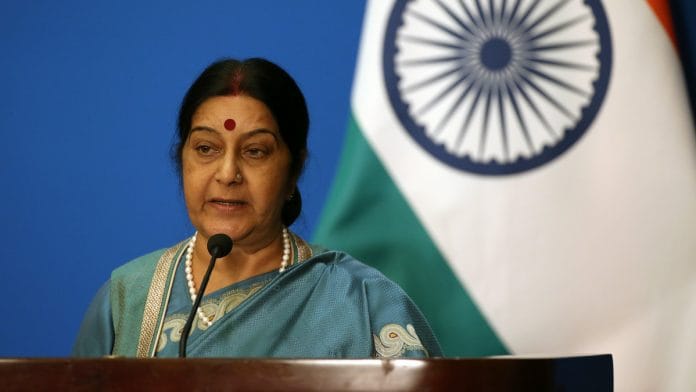Move is significant as it indicates major shift in India’s Afghanistan policy — that New Delhi won’t participate in talks which are not led by Afghan govt.
New Delhi: India may soon become part of a regional grouping with the US, Afghanistan and Pakistan, which will be focussed on sending inputs to a larger dialogue that America is spearheading on peace and reconciliation in Afghanistan. New Delhi is not part of the larger dialogue.
This was discussed during a meeting between US Special Representative for Afghanistan Reconciliation Zalmay Khalilzad and External Affairs Minister Sushma Swaraj, which took place late Thursday, said sources.
“We are working on a regional grouping on the peace talks where India will be a party,” Khalilzad told ThePrint earlier in the day on the sidelines of the Raisina Dialogue organised by the Observer Research Foundation.
Khalilzad is leading an inter-agency delegation to India, China, Afghanistan and Pakistan from January 8-21. During his visit to India, Khalilzad is expected to meet with senior government officials in an effort to facilitate an intra-Afghan political settlement.
The meeting assumes significance as India has so far maintained it will not involve itself in any talks that were not led by the Afghan government. But now, with US speaking to the Taliban directly, with China and Pakistan in confidence — apart from the Afghanistan government — India has changed its stance and agreed to be part of a regional grouping.
Also read: Americans won’t leave Afghanistan, they did not come to leave: Hamid Karzai
India’s earlier stance
As the 17-year war rages in Afghanistan, India has maintained it will engage with the Taliban but only at a “non-official” level. In November last year, the government sent two former diplomats — Amar Sinha, India’s former envoy to Afghanistan, and T.C.A. Raghavan, former High Commissioner to Pakistan — to represent India in Moscow, where the last round of the US-led peace and reconciliation talks took place.
India has said that any kind of talks of peace and reconciliation with the Taliban should be Afghan-owned and Afghan-controlled, with the participation of the government of Afghanistan.
The issue of the regional grouping was also believed to have been discussed during a meeting between National Security Advisor Ajit Doval and his Afghan counterpart Hamidullah Mohib, which took place in New Delhi last week.
Concerns over Pakistani involvement
These developments come in the wake of the US’ decision to cut the presence of its troops by half, even as it has urged all stakeholders, including India, to take up a more combative role in Afghanistan by sending its security forces there to fight the Taliban.
India is also concerned with the fact that not only is the US dealing with the Taliban directly, it has also involved Pakistan in the process, throwing up security challenges for New Delhi.
Ever since the Ashraf Ghani government came to power in Afghanistan, it has not been able to clearly spell out to the US its displeasure at involving Pakistan in the peace talks or in the reconciliation process with the Taliban.
Earlier in the day, former Afghanistan President Hamid Karzai said Pakistan should be involved in the dialogue process. He also hoped that Khalilzad will be able to understand the sensitivities of the people of Afghanistan better as he is an Afghan, and be able to bring fruitful results.
Also read: India needs to join the bandwagon on engaging with Taliban, J&K is different: Army chief






